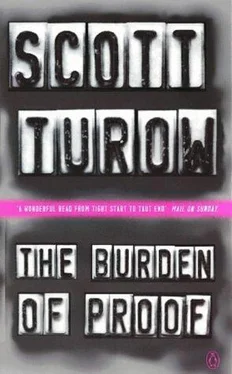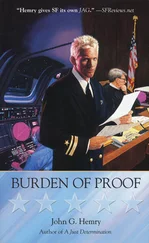Scott Turow - The Burden of Proof
Здесь есть возможность читать онлайн «Scott Turow - The Burden of Proof» весь текст электронной книги совершенно бесплатно (целиком полную версию без сокращений). В некоторых случаях можно слушать аудио, скачать через торрент в формате fb2 и присутствует краткое содержание. Жанр: Детектив, на английском языке. Описание произведения, (предисловие) а так же отзывы посетителей доступны на портале библиотеки ЛибКат.
- Название:The Burden of Proof
- Автор:
- Жанр:
- Год:неизвестен
- ISBN:нет данных
- Рейтинг книги:3 / 5. Голосов: 1
-
Избранное:Добавить в избранное
- Отзывы:
-
Ваша оценка:
- 60
- 1
- 2
- 3
- 4
- 5
The Burden of Proof: краткое содержание, описание и аннотация
Предлагаем к чтению аннотацию, описание, краткое содержание или предисловие (зависит от того, что написал сам автор книги «The Burden of Proof»). Если вы не нашли необходимую информацию о книге — напишите в комментариях, мы постараемся отыскать её.
The Burden of Proof — читать онлайн бесплатно полную книгу (весь текст) целиком
Ниже представлен текст книги, разбитый по страницам. Система сохранения места последней прочитанной страницы, позволяет с удобством читать онлайн бесплатно книгу «The Burden of Proof», без необходимости каждый раз заново искать на чём Вы остановились. Поставьте закладку, и сможете в любой момент перейти на страницу, на которой закончили чтение.
Интервал:
Закладка:
Radczyk's car, an old Reliant, was in the loading zone behind the building. Stern took the door handle and was ready to alight when he was struck again with that sensation, clear as d.jd vu, that none of this had happened, that this actual moment was not occurring. Not this or anything of the last week, weeks, months. He was someone else, somewhere else. This was all the concoction of some stupefied wreck in the comer cot of a distant bedlam. He stared at the amber circles thrown down by the crane-necked street lamps and returned gradually to his life.
They carried Dixon under the sheet. Radczyk propped the building's from doors open with pieces of' cardboard and they hauled Dixon around to the back service elevator. In a building tenanted principally by lawyers, someone was likely to be here, even at 5:45 in the morning. In the dirty elevator, they kept Dixon, taller than both of them, between them, under his pale blue sheet. Radczyk held the body upright with a hand on D'nton's belt.
In Stern's office, they attempted to position him, as he had been on those two recent nights, on the sofa. Stern crossed Dixon's legs, and with that the body rolled slowly forward, collapsing by stages, until it arrived with a heavy helpless thump on the floor.
Stern covered his face. It could not be avoided. Both Radczyk and he laughed out loud.
Then they placed him once more on the sofa, holding him there. Stern unbuttoned Dixon's jacket, lifted his hands.
He was like a store mannequin now. When Stern bent Dixon's legs to position his feet, Dixon's head fell backward, his mouth open, agape, in an unmistakable pose of death.
Neither Radczyk nor he moved for a moment.:
"How may I thank you, Lieutenant?" Stern asked as Radczyk started to leave.
"No need," said Radczyk, He looked at Stern sadly. "I owed you. I told ya. Never woulda straightened myself out otherwise."
Radczyk had said he owed him forty ftmes if he had said it once, and Stern had never caught the meaning But now he did. There was a reason Radczyk sat through each of Marvin's meetings with Stern. A reason for his nervous garrulousness. He and Marvin, after all, were raised as brothers. They had shared many things. Too many. Rad-czyk, given a reprieve and the opportunity for reform, had seized it; Marvin took the more familiar cturse. Stern shared a look with Radczyk, this man whom he barely knew-:they possessed many of each other's most terrible secrets. Then Stern simply nodded, a compact of confidence, gratitude, renewal.
Stern saw the policeman to the outer door and then, on second thought, went back to retrieve the sheet. He wanted no telltale signs when the others arrived here this morning.
Then he returned to his office and was alone with the body of his brother-in-law, Dixon Harmell. There was no comfortable place to. sit.
The sofa clearly was out, and his desk chair was still beneath the broken glass, which had not been removed or replaced, given the spell of busy activity for Remo's trial. Stern was required to use one of the uphol stered pull-up chairs, cut a bit too narrowly for him. He hauled the chair about to face the body. How sad Dixon looked, how fully depleted. His color was unnatural, that dark gray veiced him once more on the sofa, holding him there. Stern unbuttoned Dixon's jacket, lifted his hands.
He was like a store mannequin now. When Stern bent Dixon's legs to position his feet, Dixon's head fell backward, his mouth open, agape, in an unmistakable pose of death.
Neither Radczyk nor he moved for a moment.:
"How may I thank you, Lieutenant?" Stern asked as Radczyk started to leave.
"No need," said Radczyk, He looked at Stern sadly. "I owed you. I told ya. Never woulda straightened myself out otherwise."
Radczyk had said he owed him forty ftmes if he had said it once, and Stern had never caught the meaning But now he did. There was a reason Radczyk sat through each of Marvin's meetings with Stern. A reason for his nervous garrulousness. He and Marvin, after all, were raised as brothers. They had shared many things. Too many. Rad-czyk, given a reprieve and the opportunity for reform, had seized it; Marvin took the more familiar cturse. Stern shared a look with Radczyk, this man whom he barely knew-:they possessed many of each other's most terrible secrets. Then Stern simply nodded, a compact of confidence, gratitude, renewal.
Stern saw the policeman to the outer door and then, on second thought, went back to retrieve the sheet. He wanted no telltale signs when the others arrived here this morning.
Then he returned to his office and was alone with the body of his brother-in-law, Dixon Harmell. There was no comfortable place to. sit.
The sofa clearly was out, and his desk chair was still beneath the broken glass, which had not been removed or replaced, given the spell of busy activity for Remo's trial. Stern was required to use one of the uphol stered pull-up chairs, cut a bit too narrowly for him. He hauled the chair about to face the body. How sad Dixon looked, how fully depleted. His color was unnatural, that dark gray veinous shade. The spirit had red.
"Does good always win, Dixon?" Stern asked. "It does on TV."
He had no idea how the words came to him or why, with them, he began to cry. The tears ha,d been in the offing for some days now; that he knew.
He.was puzzled merely by the tuoment. But there was no point in holding back. The storm blew up and through him. He covered his mouth with his hanky and pressed his fist to his lips at moments to suppress his howl.
"My God, Dixon," he kept repeating when he spoke. When he was done, he stood, approached the sofa, and decided to pray. He had never been certain what it was he believed. On High Holidays he attended shul and engaged the Lord in direct address. The rest of the year he seemed agnostic. But at this point, he called on his talent for sincerity, since he was his finest self, an advocate not speaking on his own behalf.
Accept, dear God, the soul of Dixon Hartnell, who made his own amends, and who traveled his own way. He failed, as we all fail, and perhaps more often than some. Yet he recognized fundamental things. Not that we are evil; for we are not. But that, by whatever name-self-interest, impulse, anger, lust, or greedrowe are inclined that way; and that it is our tragedy to know this can never change; our duty to try at every moment to overcome it; and our glory occasionally to succeed.
An extra suit hung behind the office door, and Stern quickly changed. He had a tie and shirt in a drawer, and a razor. He would not have his attache case, but in the confusion no one would notice. He went down the hall to shave, returned, and sat before the telephone. When he heard the first stirring of someone else within the office, he would call Silvia to tell her he had just found Dixon, here where he had spent many recent nights, intent, obsessed with assembling his defense.
From this side of the desk, he faced the shelves of the walnut cabinet where the framed photographs of his family remained, the ones Dixon had lingered with last week. They were free. Totally. John. Kate. Even Peter. That thought had not occurred to him until now. With Dixon's death, the entire matter was over. The events-theft shamemwould recede into the past. With Clara's fortune, they were now even prosperous. The three of them would have their second chances, too. He tried to envision theft futures and his with them, but nothing came-murky shades, something bleak.
Then he recalled. There would be a baby-a child. Children always drew a family together. Even his, he supposed. He had some vision, like a vaguely surreal painting, the strange conjunctions of a dream, of all of them drawn close to this pink, unknown infant in a kind of halo radiance, each face alight with that wonderful instinctive glee. They would surround this child and be, each of them, someone new: parents, grandparent, uncle, aunts. New responsibilities. Fantasies. Dreams.
Читать дальшеИнтервал:
Закладка:
Похожие книги на «The Burden of Proof»
Представляем Вашему вниманию похожие книги на «The Burden of Proof» списком для выбора. Мы отобрали схожую по названию и смыслу литературу в надежде предоставить читателям больше вариантов отыскать новые, интересные, ещё непрочитанные произведения.
Обсуждение, отзывы о книге «The Burden of Proof» и просто собственные мнения читателей. Оставьте ваши комментарии, напишите, что Вы думаете о произведении, его смысле или главных героях. Укажите что конкретно понравилось, а что нет, и почему Вы так считаете.












